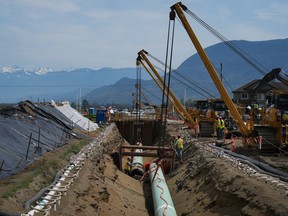Grim Forecast for New Energy Infrastructure Era
From its inception, the notion of constructing another pipeline through British Columbia's mainland sparked controversy.
I have consistently voiced my concerns about the implications of such a project.
As we delve into the intricacies of this pipeline debacle, it becomes apparent that this issue transcends mere infrastructure development, touching upon deeper political motives and consequences for property owners.
A Misguided Venture
I've long maintained that building a pipeline through the Lower Mainland was a misguided endeavor from the very start.
The cancellation of the Northern Gateway project in favor of this new venture, orchestrated by Prime Minister Trudeau, has been perceived by some as a deliberate move to turn public opinion against pipelines and the carbon energy industry.
Predicting the Outcome
My predictions were dire, asserting that even under private management, the pipeline project was doomed to fail.
With government funding and bureaucratic oversight, the project appeared destined to meet an unfortunate end, aligning with Trudeau's not so hidden agenda.
The selection of a route through the most populous area of BC, replete with passionate activists, was a recipe for disaster, with potential to deliver a serious blow to the pipeline industry.
Trudeau's Strategic Calculations
I raise a thought-provoking question: Why embark on a pipeline project in an area teeming with activism if not to strategically undermine the industry?
I suggest that perhaps Prime Minister Trudeau is more astute than he lets on, successfully garnering support for the project even from Alberta, all while advancing his political agenda.
Consistency in My Stance
Despite the twists and turns in this pipeline saga, I remain unwavering in my convictions.
My perspective today echoes what I have said since TMX was nationalized: my belief is that this pipeline venture was destined for trouble, including far-reaching implications for property rights.
The Changing Landscape
An interesting development has been the ongoing retirement of Enbridge's top executives, beginning with Al Monaco earlier this year.
This transition, coupled with the perceived alignment of companies like TC Energy with government interests, raises concerns about their roles in supporting governmental agendas rather than looking out for the interests of their pipeline landowner partners.
A Bleak Outlook for Property Rights
Finally, my assessment of the situation remains grim.
Pipeline landowners may have to say farewell to their property rights in the wake of industry's new direction.
The never ending pipeline debate transcends infrastructure and property rights.
I will continue to try to shed light on the deeper political motivations and their consequences in this new era for energy transport.
As we navigate this landscape, it remains crucial to consider not only the physical implications of pipeline construction but also the broader implications for property owners and the energy industry as a whole.
Yours for property rights,
Dave Core
Director of Special Projects

The expansion of a Canadian government-owned oil pipeline from Alberta to the Pacific Coast could be delayed by nine months if regulators don’t approve a route alteration, the project’s builder said in a regulatory filing.
The expanded Trans Mountain might not be completed before December 2024 in a “worst-case” scenario where regulators force the company to stick with a plan to tunnel under land that’s important to a local indigenous community, according to a filing with the Canada Energy Regulator. The earliest the tunneling could be completed is by April, the company said.
Trans Mountain is seeking approval for a route change in British Columbia that would scrap the tunneling project in favor of an alternative that’s more intrusive — but cheaper — after running into engineering challenges. But the local Stk’emlúpsemc te Secwépemc Nation, or SSN, opposes the change, saying the change would do “irreparable harm” to its cultural and spiritual rights. The regulator has scheduled public hearings on the proposed change for this month.
Trans Mountain didn’t immediately respond to an email seeking comment.
Prime Minister Justin Trudeau’s government bought the project from Kinder Morgan in 2018 after the company threatened to pull the plug on it amid fierce opposition in British Columbia.
Do you like this page?

